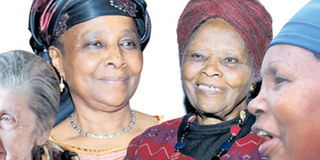Women who inspired my writing

From left: Marjorie Oludhe Macgoye, Prof Micere Githae Mugo, Muthoni Likimani and Grace Ogot. Photo/FILE
What you need to know:
- When I was about five, I met Asenath Bole Odaga. I remember the word “writer” associated with her.
- The idea of penning a book was, for me, a magical doorway into other worlds.
- The other female writer I hold in awe is Muthoni Likimani, before whom I am tempted to kowtow.
Few writers are motivated by only one muse, and I am no exception. I draw my inspiration from conversations in market places, hair salons, public transport and airport transit lounges.
There are many people to whom I owe a debt of inspiration, but I do not know their names.
On the publication of my debut novel Dust, for example, there are names that need to be mentioned — a group of Kenyan women and men writers, elders who often go unacknowledged.
There are women who dared to imagine and write; who made our childhood dreams grow and grow, and on whose shoulders I firmly stand.
When I was about five, I met Asenath Bole Odaga. I remember the word “writer” associated with her.
The idea of penning a book was, for me, a magical doorway into other worlds. The book we had in the house was called The Secret of Monkey Rock.
Oh, the feeling the story gave me, and the power of the name at the bottom of the cover. It suggested a person who had access to secret worlds.
The idea of having part ownership of a phenomenon I was allowed to call “Aunty Asenath,” even though in the passing years I lost sight of her, must have impinged on a deep part of my soul.
Her children’s stories in the languages of my life, and her towering presence is a potent source of inspiration and strength on the literary road upon which I wander.
The other female writer I hold in awe is Muthoni Likimani, before whom I am tempted to kowtow.
She probably imagines I am a little touched in the head when I speak to her because if I am not babbling, I am dogging her footsteps eavesdropping on what she is saying and hyper nodding even if the message is not for me.
MY SOUL IS STRUGGLING TO HONOUR HER
Maybe this is a good time to let her know that I am not stalking her; that my soul is merely struggling to honour her for who she has dared to be; for the words she has chosen and for her enduring strength in a literary world that was not always kind to a woman who writes.
Marjorie Oludhe Macgoye’s lyrical socio-political explorations in her Coming to Birth, illicitly read off the shelf of an aunt-seized me. Her sense of characters organic to the Kenyan experience made them so real and likely to be encountered on the streets.
Grace Ogot. What can one add? Land Without Thunder. That book. It was a set book and I remember longing for the literature class to start so we could read it together.
I would savour that book, refusing to read ahead of the class for the sheer deliciousness of the collective experience of its stories, which seemed to allow for mythic proportions and archetypes to emerge.
I have always wanted to ask her what other stories lurk untold within her being.
It is from her that I learned that you could write English in the “language” of the characters — convey the language of, and even hear the cadence of the language of say, Luo characters, even though the entire text was written out in English.
The worlds she evoked where elements of landscape have agency expanded the reaches of imagination, and suddenly, everything became a possibility. Attempting to name all who have inspired and still inspire me is a bit like opening a gigantic Russian Matryoshka doll.
I still hear words of inspiration from the stately Prof Micere Mugo, “Write, my girl. You must write and never stop.” Rebecca Njau, whose name and presence infuses the air and life of any person wandering the artistic path in Kenya.
Margaret Ogola from whom I gleaned the necessity of being in life, seizing it in the dimensions it offers you. This list and my debt continues through these women into art and music.
However, there is one name still that cannot go without mention.
This story was first published in the East African. CLICK HERE to read the full article




